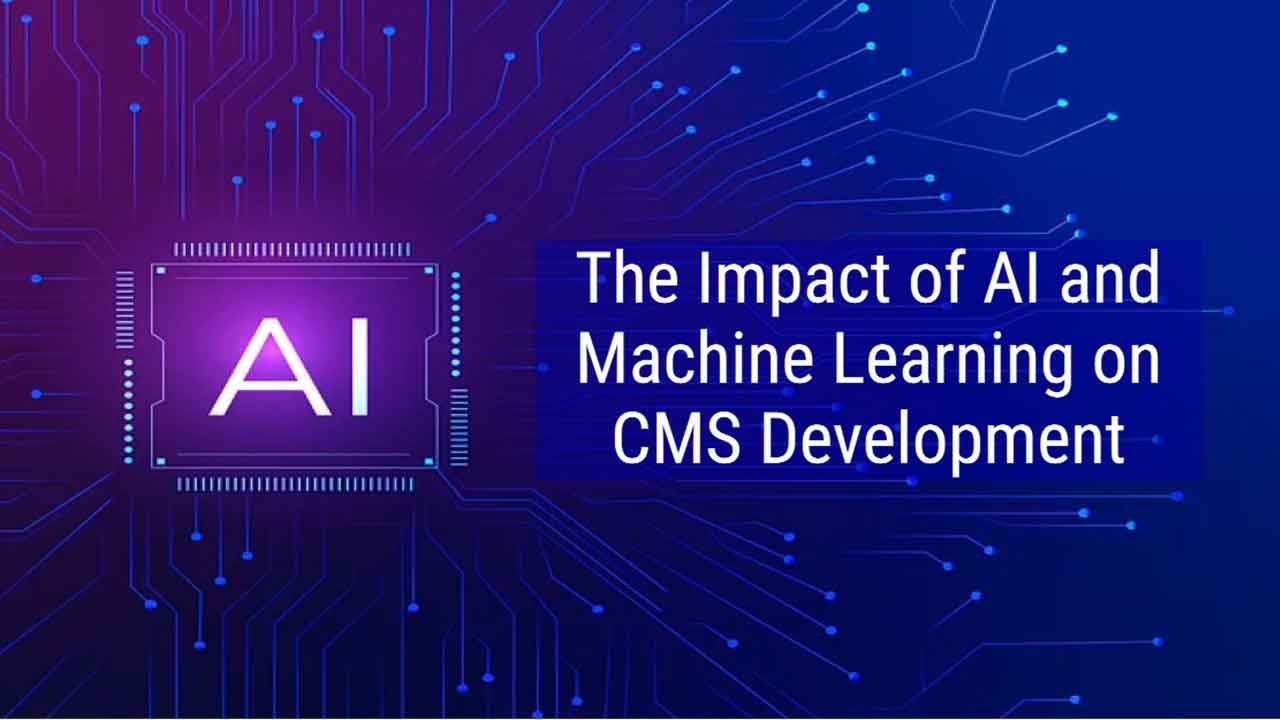
Artificial intelligence (AI) and machine learning (ML) technologies have emerged as game-changers in the CMS landscape, offering powerful tools to automate tasks, analyze data, and personalize content delivery.
Read on to explore how AI and ML revolutionize content management systems, improve digital experiences, and help businesses work smarter and generate new ideas.
Benefits of integrating AI and ML in CMS development
Enhanced user experience
AI and ML technologies enhance the user experience by tailoring content and interactions to individual preferences. Imagine a CMS website that learns what users like, how they navigate the platform, and what content engages them the most. By analyzing this data, the CMS website can create a personalized experience for each user, making them feel understood and valued.
This customization leads to increased user satisfaction, longer engagement times, and stronger user loyalty. AI and ML transform the CMS website into a platform that feels intuitive, relevant, and uniquely suited to each user’s needs.
Increased efficiency in content creation and management
The integration of AI and ML into CMS streamlines content creation and management processes. These technologies automate routine tasks like content tagging, metadata generation, and even content creation, freeing up developers’ time for more strategic endeavors. It helps accelerate content production and lets developers adapt more quickly in response to user feedback and market trends.
Better data analysis
Using AI and ML in CMS platforms helps extract actionable insights from vast amounts of data, providing developers with a deeper understanding of user behavior and content performance. This analysis of user interactions, engagement metrics, and market trends provides valuable insights that help developers make informed decisions that drive CMS website growth.
Applications of AI and ML in CMS development
Automated content organization
Machine learning algorithms can analyze the content and extract key features or keywords to assign appropriate tags automatically. Imagine you upload a bunch of articles to your website. AI can analyze the content and figure out what each article is about. Then, it adds tags like “technology,” “sports,” or “food” to help organize and categorize them.
By doing so, CMS platforms can ensure that content is properly labeled and easily searchable, making it easier for users to find what they’re looking for. Additionally, automating these processes saves CMS site owners valuable time, reducing the need for manual intervention.
AI-powered chatbots
Integrating an AI-powered chatbot into a CMS website helps understand user queries and provide relevant responses in real-time. They work like virtual assistants that can answer questions, provide assistance, or suggest relevant products.
Chatbots may learn from each interaction, getting smarter over time. Additionally, they offer round-the-clock assistance to users and allow organizations to handle a larger volume of inquiries without significantly increasing staffing costs.
Dynamic content recommendations
An AI-powered CMS website can analyze a user’s past interactions (such as articles read, products viewed, or search queries made) to gain insights into the audience’s interests and preferences. This in-depth user behavior analysis helps the website to serve dynamic content that is highly relevant and engaging to each user.
For example, if someone has shown interest in gardening articles in the past, the website may suggest related topics such as plant care guides and gardening tools. This personalized approach keeps users interested and coming back for more, increasing engagement and loyalty.
Predictive analytics for strategic content planning
AI in CMSs facilitates predictive analytics by analyzing large data sets. Through machine learning algorithms, AI can process historical data on content performance, user interactions, and market trends to make predictions about future outcomes.
For example, within CMSs, AI can analyze past content engagement metrics such as click-through rates, time spent on the website page, and social media shares to identify which types of content resonate most with the audience. By understanding these patterns, AI can predict which topics, formats, or distribution channels are likely to perform well in the future.
This insight helps CMS website owners make informed decisions about what content to create when to publish it, and how to promote it to maximize its impact. This proactive approach to content planning helps businesses stay ahead of the curve, attract more users, and drive greater engagement and conversions.
Challenges of integrating AI and ML in CMS development
Data quality and availability issues
AI systems depend on large datasets to learn and make accurate predictions. Consequently, one major challenge lies in ensuring the quality and accessibility of data necessary to train AI and ML algorithms. If the data is incomplete or outdated, it can lead to inaccurate results.
Addressing these challenges requires thorough data validation processes to identify and rectify any inconsistencies or inaccuracies in the collected data. Furthermore, continuous monitoring and updating of datasets are necessary to prevent them from becoming outdated, thus maintaining the accuracy and reliability of AI predictions.
Need for skilled professionals
Developing AI-powered CMSs requires expertise in data science and machine learning. Organizations may find it challenging to find qualified professionals in these domains. Moreover, training existing staff or hiring external experts can be costly and time-consuming.
Addressing this challenge requires individuals with different skills to work together. Organizations might have to partner with a CMS web development company to ensure the successful integration of AI into CMSs.
Security and privacy concerns
Training AI and ML models with user data raises concerns about the privacy of sensitive information. Unauthorized access or misuse of this data could lead to privacy breaches and violations of user trust.
This requires implementing robust security measures like data encryption, access controls, and anonymization techniques. Additionally, organizations must establish clear policies and procedures for data handling, storage, and disposal to mitigate potential risks and maintain trust with users.
Integration complexities with existing CMS solutions
Many existing CMS websites may not be designed to support AI capabilities, requiring custom development or third-party integrations. These CMS web solutions may use different technologies, frameworks, or architectures that are not easily compatible with AI components.
Ensuring smooth integration without disrupting the functionality of the CMS website or causing conflicts with existing plugins and modules can be a complex task. Addressing these complexities will require choosing the right infrastructure and hiring an experienced CMS developer who can perfectly handle all technicalities.
Final thoughts
The impact of AI and ML on CMS development extends beyond mere technological advancements. It signifies a paradigm shift in how content is created and managed in CMS solutions. As these technologies continue to evolve, the future of CMS development holds immense promise for delivering seamless, personalized experiences that enrich users’ digital journeys worldwide.
Author Bio:
Nathan Smith has over a decade of experience in the IT industry. He shares his knowledge and insights through his writing, covering the latest trends, technologies, and best practices in web and app development, WordPress development, eCommerce development, and related fields. His articles cater to technology stakeholders, developers, designers, and tech enthusiasts alike.
